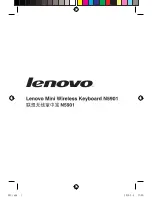
System Exclusive Protocol
K2vx System Exclusive Implementation
30-3
DUMP = 00h
type(2) idno(2) offs(3) size(3) form(1)
Érequests the K2vx to send a data dump of an object or portion thereof. ÔtypeÕ and ÔidnoÕ
identify the object. ÔoffsÕ is the offset from the beginning of the objectÕs data and ÔsizeÕ describes
how many bytes should be dumped starting from the offset. ÔformÕ indicates how the binary
data is to transmitted (0=nibblized, 1=bit stream). The response is a LOAD message:
LOAD = 01h
type(2) idno(2) offs(3) size(3) form(1) data(n) xsum(1)
Éwhich writes data into the speciÞed object, which must exist. Both load and dump operate on
the object data only. The response to a load message will be
DACK = 02h
type(2) idno(2) offs(3) size(3)
Émeaning Òload acceptedÓ, or
DNAK = 03h
type(2) idno(2) offs(3) size(3) code(1)
Émeaning Òload not accepted.Ó The ÔcodeÕ Þeld indicates the cause of the failure, as follows::
code
meaning
1
Object is currently being edited
2
Incorrect checksum
3
ID out of range (invalid)
4
Object not found (no object with that ID exists)
5
RAM is full
To request information about an object, use:
DIR = 04h
type(2) idno(2)
The ÔtypeÕ and ÔidnoÕ identify the object. The response is an INFO message:
INFO = 05h
type(2) idno(2) size(3) ramf(1) name(n)
This is the response to DIR, NEW, or DEL. If object is not found, ÔsizeÕ will be zero and ÔnameÕ
will be null. ÔramfÕ is 1 if the object is in RAM.
NEW = 06h
type(2) idno(2) size(3) mode(1) name(n)
Écreates a new object and responds with an INFO message of the created object. The objectÕs
data will not be initialized to any default values. If ÔidnoÕ is zero, the Þrst available object ID
number will be assigned. If ÔmodeÕ is 0, the request will fail if the object exists. If ÔmodeÕ is 1,
and the object exists in ROM, a RAM copy will be made. If ÔmodeÕ is 1, and the object exists in
RAM, no action is taken.
DEL = 07h
type(2) idno(2)
Édeletes an existing object and responds with an INFO message for the deleted object. If there
is only a RAM copy of the object, the response will indicate that the object doesnÕt exist
anymore. However, if the deletion of a RAM object uncovers a ROM object, the INFO response
will refer to the ROM object. A ROM object cannot be deleted.
Summary of Contents for K2500RS
Page 12: ...Table of Contents TOC 12...
Page 16: ...Introduction How to use this manual 1 4...
Page 32: ...User Interface Basics The Panel Play Feature K2vxR 3 8...
Page 106: ...Effects Mode and the Effects Editor Configurations and Parameters 9 24...
Page 186: ...Song Mode Recording Multi timbral Sequences via MIDI 12 52...
Page 304: ...DSP Functions Hard Sync Functions 14 52...
Page 394: ...Programs Setups and Keymaps K2500 ROM Keymaps 21 12...
Page 402: ...LFOs LFO Shapes 23 4...
Page 406: ...Note Numbers and Intonation Tables List and Description of Intonation Tables 24 4...
Page 434: ...DSP Algorithms 26 14...
Page 450: ...MIDI and SCSI Sample Dumps SMDI Sample Transfers 29 8...
Page 464: ...Glossary 31 6...
Page 490: ...K2vx Program Farm VOX K25 Appendix A 22...
Page 494: ...K2vx Compatibility Converting programs from the K2vx to K2000 Appendix B 4...
















































